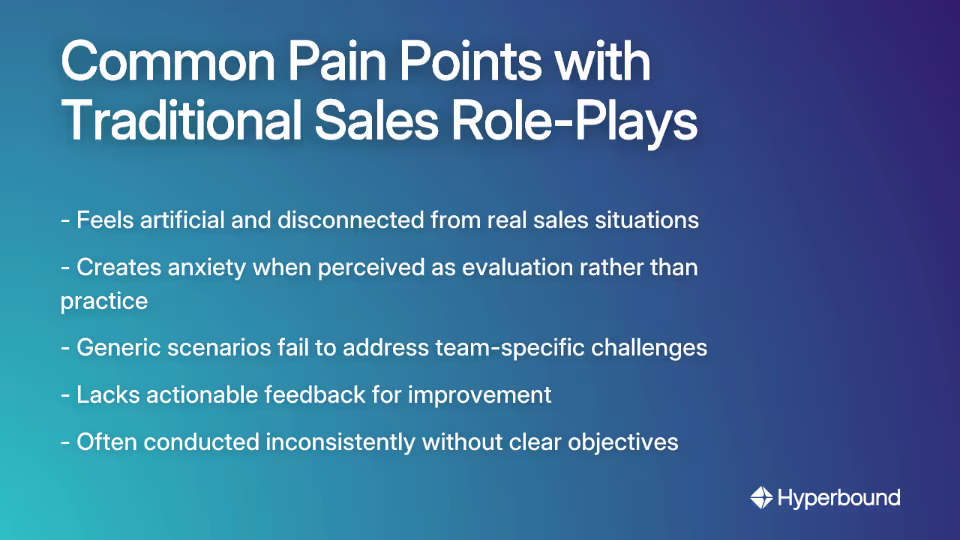.avif)
You mention the words "sales role-play" in your next team meeting and watch as the collective groan ripples through the conference room. Eyes roll, shoulders slump, and someone inevitably mutters something about "another waste of time" just loudly enough for everyone to hear.
Sound familiar?
If you're a sales manager, you've witnessed this reaction. The universal disdain for role-playing exercises isn't without reason. Sales professionals regularly describe these sessions as "inorganic," "unrealistic," and even "anxiety-inducing" – especially when they feel like they're being judged rather than coached.
But here's the truth: role-playing, when done right, remains one of the most powerful tools in your sales training arsenal. The problem isn't the concept itself, but how most teams execute it.
This article provides a practical playbook to transform role-playing from a dreaded obligation into a valuable exercise your team will actually appreciate – perhaps even look forward to. By focusing on authentic scenarios, creating a low-pressure environment, and emphasizing coaching over evaluation, you can develop a practice routine that genuinely improves performance.
Why Traditional Role-Plays Fail
Before diving into solutions, let's understand why so many sales teams resist role-playing:

1. It Feels Fake
The biggest complaint about role-playing is the lack of realism. When scenarios feel contrived, reps disengage because the exercise doesn't reflect their actual selling experience.
As one sales rep noted on Reddit, there are significant "challenges in replicating real customer interactions" during role-plays. This is especially true for complex, relationship-based sales cycles that can't be reduced to a quick simulation.
2. It Feels Like a Performance Review
Many reps experience intense discomfort and anxiety during role-plays because they feel they're being evaluated rather than coached.
When managers use role-play to berate salespeople or treat sessions as high-stakes tests, they create fear and defensiveness – killing any chance of productive practice.
3. One-Size-Fits-None
Generic role-play scenarios often fail to address the nuanced challenges different team members face. Experienced reps, in particular, often feel role-playing is "less beneficial" for them compared to new hires in a transactional sale environment.
The Foundational Shift: From Judgment to Coaching
Transforming your approach begins with a fundamental mindset shift:
Principle 1: It's Practice, Not a Performance
Frame the entire exercise as a low-pressure activity designed to build skills, not showcase them. Training Industry research shows this approach builds confidence and creates psychological safety – essential conditions for pushing comfort zones without triggering anxiety.
As a manager, explicitly communicate: "This isn't about showing me how good you are. It's about trying new techniques in a safe environment where mistakes have zero consequences."
Principle 2: Make Feedback Collaborative and Actionable
Instead of the manager listing faults, start by asking the rep: "What did you feel worked well? What would you change next time?"
This encourages self-evaluation and makes the feedback process collaborative rather than dictatorial. When reps identify improvement areas themselves, they're far more likely to implement changes.
When you do offer feedback, keep it focused. Limit suggestions to one or two adjustments at a time. Overwhelming a rep with numerous corrections is counterproductive – they won't remember everything, and the experience becomes demoralizing.
Principle 3: Embrace Mistakes as Learning Tools
Create a culture where mistakes during practice are not just acceptable but expected and valued. As Training Industry notes, allowing "sales reps to make mistakes and learn from them" builds the resilience needed for real-world calls.
When a rep stumbles, respond with curiosity rather than criticism: "Interesting approach. Talk me through your thinking there." This turns awkward moments into learning opportunities.

The Playbook: Step-by-Step Guide to Effective Role-Plays

With the right mindset established, here's your practical framework:
Step 1: Use Real Plays, Not Invented Scenarios
Ditch the generic scripts. The most authentic scenarios come directly from your team's actual experiences.
Action Plan:
- In your weekly sales meetings, ask: "What objections from the past week stumped you?"
- Have reps volunteer real challenges they've faced.
- Use these authentic situations as the foundation for your role-play exercises.
Many sales professionals find reviewing "actual recorded sales calls and demos to be a much better use of time" than artificial role-plays, according to forum discussions. Leverage this preference by incorporating call recordings into your preparation process.
When constructing scenarios, provide rich details that mirror your reps' daily encounters. For example, instead of saying "the prospect has a budget objection," create a fully realized situation:
"You're speaking with the Chief Marketing Officer at a mid-market healthcare company. They love your solution but just had their budget frozen due to an acquisition. They mention a competitor is offering similar functionality for 30% less. How would you handle this?"
This level of detail creates a genuine interaction that feels less like an improv exercise and more like valuable preparation.
Step 2: Define Clear and Specific Objectives
Every role-play needs a purpose beyond just "practice." Define both the ultimate goal and specific sub-goals tailored to each rep's development needs.
Example Objectives:
- Ultimate Goal: Successfully advance the opportunity to the next stage
- Sub-Goal 1: Effectively handle the "we need to involve procurement" objection
- Sub-Goal 2: Naturally incorporate the new ROI calculation into the conversation
These specific objectives give the exercise focus and make improvement measurable.
Step 3: Run Targeted Drills, Not Full Scrimmages
Instead of long, meandering mock discovery calls, focus on specific skills with targeted scenarios. This approach is more efficient and addresses your team's desire for focused practice on real-world sticking points.
Here are high-impact scenarios worth practicing:
- The Price Haggler: "Your competitor is offering a 25% discount. Can you match that?" (Objective: Negotiate without devaluing your product)
- The Feature Fanatic: "I like your product, but I need a solution with [feature your product lacks]." (Objective: Manage expectations while highlighting existing value)
- The Reluctant Revealer: "I'm not comfortable sharing that information at this stage." (Objective: Build trust and use emotional intelligence to encourage sharing)
- The Last-Minute Objection: "Before we finalize, I heard your implementation is difficult." (Objective: Maintain composure and address concerns before closing)
- The Unexpected Curveball: "Our budget was just cut by 30%." (Objective: Adapt strategy quickly)
- The Multi-Stakeholder: "I'm concerned about budget, but my IT director is worried about security, and end-users want simplicity." (Objective: Address diverse needs)
These targeted scenarios allow reps to develop specific skills rather than trying to improve everything at once.
Step 4: Start with a "Softball"
Begin each session with an easy scenario where the rep is likely to succeed. This builds confidence and reduces the anxiety that often accompanies role-playing.
For example, start with a warm prospect who has a minor objection before progressing to more challenging scenarios. This gradual approach helps reps remain engaged rather than becoming defensive.
Amplifying Impact: Beyond the Basic Role-Play
To maximize the value of your role-play program:
Leverage Technology for Asynchronous Practice
Not all role-playing needs to happen in live sessions. Recording technology can help alleviate the anxiety of live performance while still providing valuable practice opportunities.
Encourage reps to record themselves responding to common objections or delivering their pitch. This self-reflection builds awareness before sharing with a manager or peer for feedback, as recommended by Training Industry.
Advanced AI Sales Coaching platforms like Hyperbound, Allego, and Mindtickle enhance flexibility by allowing reps to practice on their own time. These tools provide AI-powered feedback on metrics like talk-to-listen ratio and filler word usage, creating a judgment-free learning environment.
Make It a Habit, Not a One-Off Event
Ensure role-playing becomes a consistent part of your sales training approach rather than an occasional activity. Best practices recommend providing "ongoing reinforcement and multiple scenarios" rather than relying on isolated training sessions.
Supplement formal role-play with informal peer learning. Encourage what one sales rep called "coffee chats - chatting with other reps about wins and struggles on both ends and brainstorming." These casual conversations foster a collaborative culture where sharing experiences becomes natural.
Use Live Demo Role-Plays to Perfect Presentations
For teams that conduct product demonstrations, specialized role-plays that focus on the live demo can be particularly valuable. Have one rep play a distracted or technically challenged prospect while another navigates the demonstration.
This practice helps reps develop both the technical prowess and emotional intelligence needed to handle real-world presentations where things rarely go as planned.
From Dreaded Exercise to Valuable Tool
Role-playing doesn't have to be the most hated part of your sales team's week. By shifting from judgment to coaching, using real-world scenarios from your team's experience, and providing focused, collaborative feedback, you can transform role-play from an awkward obligation into a powerful skill-building tool.
The goal isn't perfection—it's progress. When your team sees role-playing as a genuine opportunity to improve rather than a performance to be evaluated, their resistance will fade and their skills will grow.
Remember these key principles:
- Use authentic scenarios based on real customer interactions
- Create a low-pressure environment focused on improvement, not evaluation
- Run targeted exercises addressing specific skills rather than generic simulations
- Provide collaborative feedback that empowers rather than criticizes
- Make role-playing a consistent habit supported by technology and peer learning
With this approach, your team might still groan when you mention role-playing—old habits die hard—but they'll engage more willingly and benefit more substantially from the practice.
And ultimately, that's what matters: not that they love the process, but that they value the results.
Frequently Asked Questions
Why do my sales reps hate role-playing?
Your sales reps likely hate role-playing because traditional methods often feel artificial, create anxiety by being treated as a performance review, and use generic scenarios that don't address their specific challenges. When reps feel judged rather than coached, they become defensive and disengaged, viewing the exercise as a waste of time.
How can I make sales role-plays more realistic?
To make role-plays more realistic, you should use real customer scenarios from your team's actual experiences instead of generic, invented ones. Ask your team about recent objections or difficult conversations they've had, and build your practice sessions around those specific, detailed situations. This makes the exercise immediately relevant and valuable.
What is the main goal of sales role-play?
The main goal of sales role-play is to provide a safe, low-stakes environment for practice and skill development, not to evaluate performance. It's a "practice, not a performance" session where reps can experiment with new techniques, make mistakes without consequences, and build confidence before engaging with actual customers.
How do I give feedback during role-play without discouraging my team?
To give effective feedback, make it a collaborative process. Start by asking the rep to self-evaluate: "What worked well? What would you do differently?" Then, offer only one or two specific, actionable suggestions. Frame mistakes as learning opportunities by asking questions like, "Talk me through your thinking there," which fosters curiosity instead of criticism.
How often should a sales team do role-play?
Effective role-playing should be a consistent, regular habit rather than a one-off event. Integrating short, targeted role-play drills into your weekly sales meetings is a great way to ensure ongoing practice. Consistency helps reinforce skills and makes the process a normal part of your team's culture, rather than a dreaded, occasional activity.
What are some good examples of role-play scenarios?
Good role-play scenarios are specific and target a particular skill. Instead of a full mock call, try targeted drills like handling a price objection ("Your competitor is 25% cheaper"), managing a feature request for something you don't offer, or addressing a last-minute concern before closing a deal. These focused exercises allow for deep practice on common sticking points.
Can AI help with sales role-playing?
Yes, AI-powered sales coaching platforms can significantly enhance role-playing by offering asynchronous practice. Tools like Hyperbound allow reps to practice on their own time in a judgment-free environment, receiving instant, data-driven feedback on things like filler words and talk-to-listen ratios. This builds confidence and offers a scalable way to supplement live coaching sessions.

Book a demo with Hyperbound
.png)













